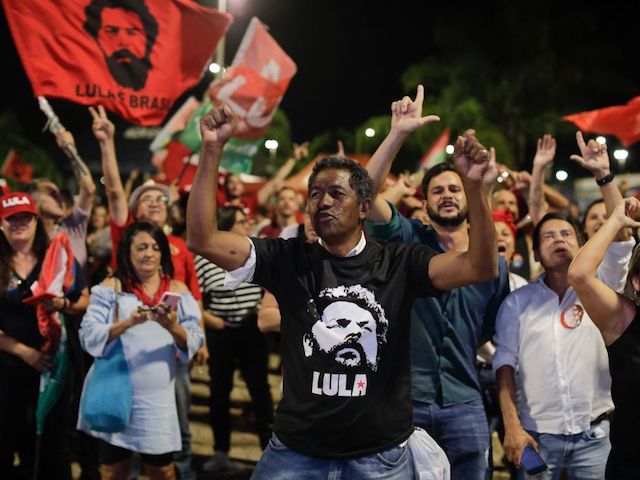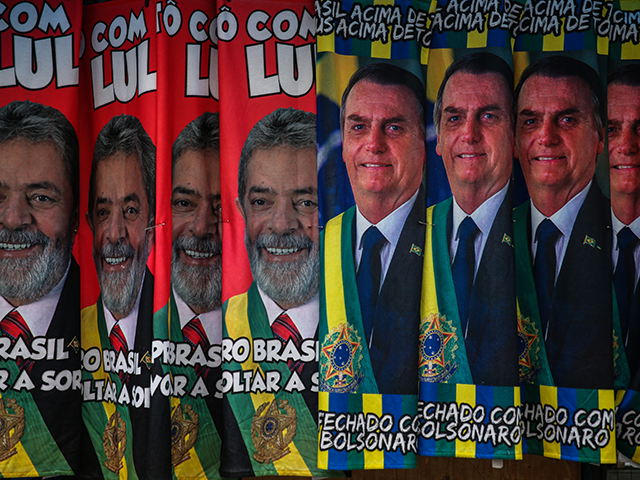Multiple polls out of Brazil on Thursday and Friday show the gap between presidential frontrunner Luiz Inácio Lula da Silva and incumbent President Jair Bolsonaro narrowing to under five percentage points — the difference between the two during the first round of voting on October 2.
In Brazil, the presidential election is either decided in one round of voting if the top candidate receives over 50 percent of the vote, or two elections if that does not occur. Lula won the first election with only 48 percent of the vote, triggering the runoff between himself and Bolsonaro, the second-place finisher. Bolsonaro came in with about 43 percent of the vote — a five percent difference that nearly every major national poll predicted incorrectly. Prior to the vote, mainstream pollsters were predicting up to 14-point leads for Lula and a decisive victory above the 50-percent demarcation, which did not materialize.
Bolsonaro, a hardline but pro-China conservative, enjoys significant leads in the country’s largest metropolitan areas, Sao Paulo and Rio de Janeiro, the latter of which he represented in Congress prior to being elected president in 2018. Marxist extremist Lula eked out a win during the October 2 election largely as a result of overwhelming leads in the country’s northeastern states, the poorest and most socialist regions.
The race narrowed after two weeks of intense, and bizarre, negative campaigning in which Bolsonaro supporters accused Lula of enjoying support from Satanists and the Lula campaign accused Bolsonaro of cannibalism.

A supporter of Brazilian President and reelection candidate Jair Bolsonaro reacts as she watches the vote count of the legislative and presidential election, in Rio de Janeiro, Brazil, on October 2, 2022. (CARL DE SOUZA/AFP via Getty Images)
A poll published Friday by the firm AtlasIntel found Lula still in the lead with 52.4 percent, but Bolsonaro at 47.6. trailing only by about five percentage points, Reuters reported. Lula’s lead widened when not taking into consideration undecided voters forced to pick a candidate and null votes, but not by much, and with Lula losing some support — 51.1 percent for Lula compared to Bolsonaro’s 46.5 percent.
Lula lead narrows to less than 5 points against Bolsonaro in Brazil election https://t.co/bBUikPJRYr
— News of The World (@WORLDN3WS) October 14, 2022
The Brazilian magazine Veja compiled several other polls published on Thursday and Friday similarly showing a narrow lead for Lula. The firm Paraná Pesquisas found an even more narrow difference between the candidates: 47.6 percent of respondents said they currently intended to vote for Lula compared to 44.1 percent who said they intended to vote for Bolsonaro. Veja noted that Paraná Pesquisas got the October 2 election wrong, but “erred less than the first-round projections of others, such as Datafolha, Ipec, Quaest, and Ipespe.”

Supporters of Brazilian former President (2003-2010) and candidate for the leftist Workers Party (PT) Luiz Inacio Lula da Silva react as they watch the vote count of the legislative and presidential election, in Brasilia, Brazil, on October 2, 2022. (SERGIO LIMA/AFP via Getty Images)
Ipespe published a poll Wednesday again showing a much wider advantage for Lula, as it did during the first round. The firm found that 50 percent of respondents supported Lula compared to 43 for Bolsonaro. Quaest also published a poll on Thursday finding a 49-to-41 lead for Lula.
The growing support for Bolsonaro found in polls appears to be fueled by positive sentiment towards Bolsonaro, not negative sentiment towards Lula, according to Reuters. The international news service noted that the AtlasIntel poll documented a massive increase in Bolsonaro’s approval rating throughout this year: “Thursday’s poll showed that 53.3% of Brazilian voters disapprove of Bolsonaro’s performance as president, versus 44.2% that approve of his way of governing Brazil, improving significantly from March, when 65% disapproved and 33% approved.”
Lula does not appear to have been significantly damaged in his support by his criminal conviction for corruption. During his presidency, from 2003 to 2011, the federal Brazilian government built a national corruption apparatus now known as “Operation Car Wash,” after the police action launched to take it down. Dozens of politicians from nearly every political party, though notably not Bolsonaro, were implicated in accepting bribes from private contractors in exchange for overpriced public works contracts. The contracts were overpriced so that the politicians and the firms could share in the excess cash.
Lula was sentenced to 25 years in prison for using “Operation Car Wash” money to build a luxury condo in 2017. Last year, the Supreme Federal Tribunal (STF), the nation’s highest court, overturned the conviction, allowing him to run against Bolsonaro. The STF claimed that the judge that led the trial against Lula, Sergio Moro was irredeemably biased. Moro, who went on to serve as justice minister under Bolsonaro, won a Senate seat in the October 2 election.
Rather than facing heat over his extensive record of corruption, Lula has spent much of the post-election season insisting that he is a Christian and not a satanist. The satanism news cycle began last week when a viral video on the Chinese social media outlet Tiktok of a woman presenting herself as a pro-Lula Satan worshipper went viral among Bolsonaro supporters. Subsequent videos appearing to show satanists engaging in sorcery to get Lula elected then surfaced, following the old footage of Lula attending an event and accepting a religious artifact associated with the Nigerian pagan god Changó.
“Lula believes in God and is Christian. Lula does not have a pact and has never had a conversation with the devil,” a Lula campaign Instagram account insisted.
Bolsonaro faced his own occult scandal last week when the Lula campaign used its designated television time to air a snippet of a 2016 interview in which Bolsonaro discussed cannibalism.
“The Indian died and they were cooking him. They cook the Indian; that’s their culture,” he claimed, discussing an anecdote that allegedly happened during his military service deep in the Amazon Rainforest. “They cook him for two or three days and they eat him with banana. I wanted to go see the Indian be cooked and a guy said, ‘if you go, you have to eat.’ So from there, I said, I eat!”
Bolsonaro claimed that he ended up not eating human flesh because nobody would go with him to the cannibal ritual.

COMMENTS
Please let us know if you're having issues with commenting.